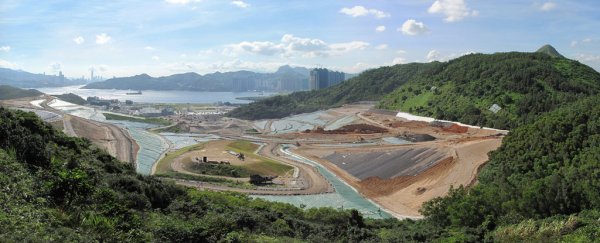Hong Kong is approaching a severe breaking point, with the brimming urban centre having almost run out of space for storing the 15,000 tonnes of garbage it produces every day.
With a population of almost 7.4 million people squeezed into a space just over 1,106 square kilometres (427 square miles) in area, Hong Kong qualifies as the world's fourth most densely populated territory – a statistic borne out by the fact that it's also the world leader in skyscrapers (with 453), boasting almost double the runner-up's tally (Dubai, on 283).
That extreme density means Hong Kong has precious little land left for stashing its high waste output, and is running out of landfill sites at an alarming rate.
Hong Kong currently has three active "strategic landfills" located in its largest region called the New Territories, but a total of 13 other garbage sites have already been filled to capacity and are now closed, having been sealed off and repurposed into things like golf courses and recreation parks.
As for the remaining three facilities, they may be living on borrowed time. Government figures released in 2013 estimate these strategic landfills will have all reached capacity by 2019, meaning Hong Kong will have to turn to alternative arrangements for getting rid of its garbage.
"We are running out of space and in some areas people are moving closer and closer to the landfills," Hong Kong's undersecretary for the environment Christine Loh told The Christian Science Monitor last month.
"We can't really extend them too much more."
Part of the problem is Hong Kong's recycling capability. Despite efforts to bolster recycling, a historic lack of full-scale recycling plants means materials earmarked for reuse actually get processed elsewhere, in countries like Malaysia and Thailand – again, because there isn't enough land to devote to processing recycling locally.
In any case, Hong Kong's lagging on recycling helps explain why its residents generate significantly more trash (1.36 kg each daily on average) than other comparable Asian metropolises – including Tokyo (0.77 kg), Seoul (0.95 kg), and Taipei (1 kg) – and it's a factor that some think has an ingrained psychological effect.
"People don't believe anything gets recycled," the CEO and founder of Hong Kong-based non-profit Plastic Free Seas, Tracey Read, told The Christian Science Monitor.
"I think people would generally be very happy to recycle if they had confidence in the system working."
Another approach to solving the problem is a markedly controversial $10 billion garbage incinerator, which could be up and running by 2025, with the capacity to burn through 30 percent of Hong Kong's garbage output in the hope of making much of the problem literally disappear into thin air.
But, inevitably, critics of the plan say that the incineration will only increase airborne pollutants in the region – while not addressing the root causes of the issue.
"The consumer will just continue to generate waste and the government will burn it all. It's the wrong concept," Edwin Lau, the founder and CEO of another environmental non-profit, Green Earth, explained to Justin Heifetz at Motherboard.
"I think the government understands the need for holistic waste management, but they need to push useful and effective policy and measures to engage the community."
A more sustainable solution could be the proposed introduction of a "waste charge", which would make local residents pay $0.11 Hong Kong dollars (about US$0.01) for each litre of trash they generate, which could act as an incentive to recycle more and produce less individual waste.
That disincentive could change thinking around garbage in Hong Kong while raising revenue to potentially help fund expanded recycling initiatives – and wouldn't create additional, costly problems, like the incinerator would seem to.
"The economic tool – to get people to understand they are going to have to pay as they throw – is very powerful," Loh told The Christian Science Monitor.
Other plans include building a food processing plant to recycle discarded but reusable food waste – facilities that could also be harnessed to produce biogas to fuel cars.
Again, there's the question of finding vacant land in one of the most densely packed places in the world so that Hong Kong could build such infrastructure – but many think it could be a way forward.
"By our rough estimation, we'd need 20 factories of that size to deal with our food waste," environmental scientist Chan King Ming from the Chinese University of Hong Kong told BBC Future in April.
"But I think it's worth doing, because we need to recycle as much usable material as possible."
Whatever course of action Hong Kong decides to pursue, it better act quickly. One thing's for sure – the clock is definitely ticking.
